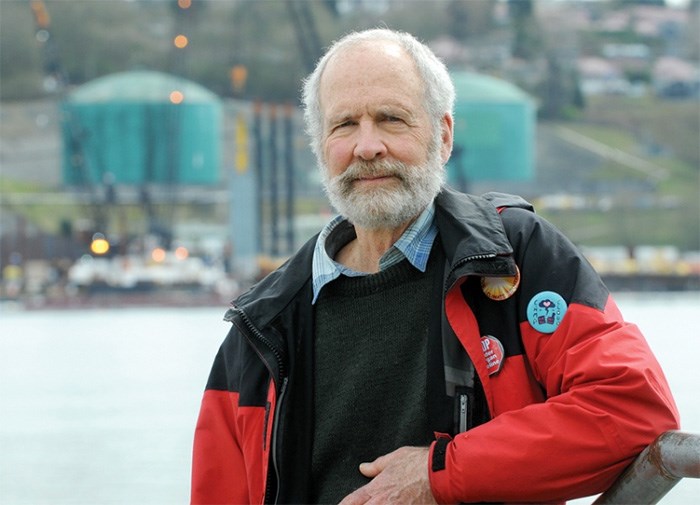 Climate change protester and North Vancouver resident Gordon Cornwall is questioning whether Kinder Morgan is serious about halting non-essential work on Kinder Morgan’s Trans Mountain’s pipeline. In the background crews continue their work on the Westridge terminal in Burnaby. photo Mike Wakefield, North Shore News
Climate change protester and North Vancouver resident Gordon Cornwall is questioning whether Kinder Morgan is serious about halting non-essential work on Kinder Morgan’s Trans Mountain’s pipeline. In the background crews continue their work on the Westridge terminal in Burnaby. photo Mike Wakefield, North Shore News
Kinder Morgan says it may be wavering on whether the Trans Mountain pipeline will be built, in light of protests and opposition from the B.C. government. But pipeline watchers are split on whether the company is serious or just trying to step up political pressure.
Kinder Morgan Canada released a statement Sunday saying it would be “suspending all non-essential activities and related spending on the Trans Mountain Expansion Project,” and putting the blame on uncertainty caused by John Horgan’s Green Party-backed NDP government.
“As KML has repeatedly stated, we will be judicious in our use of shareholder funds. In keeping with that commitment, we have determined that in the current environment, we will not put KML shareholders at risk on the remaining project spend,” said KML chairman and CEO Steve Kean in a press release.
Eugene Kung, lawyer with West Coast Environmental Law, is taking the statement as in indication the project is on its last legs.
“It seems to be clear that Kinder Morgan is finally reading the writing on the wall that’s been there for some time – that this project faces incredible uncertainty and risk – legal risk, political opposition but also the growing and deepening resistance that’s here in the Lower Mainland but all the way up the pipeline route,” he said. “It’s a project that is under duress. The economic case has been collapsing for some time and it appears Kinder Morgan is starting to understand that or least communicate that publicly.”
Gordon Cornwall, one of the protesters who participated in the blockades at the Westridge Terminal last month that resulted in a court injunction and lawsuit, isn’t quite so optimistic. Activists keeping watch on the Westridge Terminal in Burnaby have noted little change in activity at the site, he said. “They’re going at it full blast,” he said. “I think it’s primarily an attempt to pressure the federal government to, in turn, pressure the B.C. government to stop opposing the pipeline.”
Responding to Kinder Morgan’s statement, Horgan has remained steadfast, and Prime Minister Justin Trudeau has told the press he intends to see the pipeline though to completion. Alberta Premier Rachel Notely, meanwhile, is threatening to cut off oil shipments to B.C. in retaliation.
As for Notely’s threats, Cornwall expressed little concern.
“If it’s a matter of shutting off the flow of oil, I would image that might hurt Alberta more than it hurts B.C.,” he said.
“It would probably hasten the day in which we can transition away from fossil fuels, which in my view is a good thing.
But Dennis Connor, a North Vancouver clean tech CEO, is warning the protests could be counterproductive. Canada’s climate strategy, including carbon pricing, is contingent on Trans Mountain’s completion, he noted.
“If in fact that climate accord goes away, support for the development of those types of solutions will also go away. And so it will be a short-term win for the environmentalists who are arguing about the coastline, whereas in the long term, climate change is more likely to occur and that whole coastline will get inundated by sea level rise,” he said. “People are not thinking through the unintended consequences of what it is they are protesting.”
The world’s thirst for oil will be quenched with or without the Trans Mountain expansion, Connor said, but more likely from sources with less stringent greenhouse gas emission standards than the ones Canada is moving towards.
Kinder Morgan says it has given a deadline of May 31 to do further consultations with the province and shareholders before deciding next steps.
If the statement does indeed signal the impending demise of the project, Kung said opposition from First Nations including the Tsleil-Waututh and Squamish will have been the key factor.
“The beginning of the end didn’t happen (Sunday). The beginning of the end happened when Frist Nations denied their free, prior and informed consent for the project and the company decided to continue in the absence of that consent,” he said.


